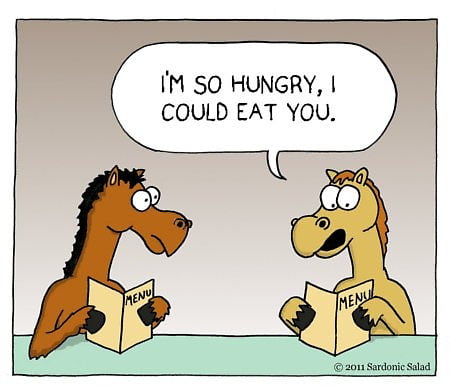“What’s in your purse, a truckload of bricks?”
“I’m so hungry I could eat a horse.“
What’s a hyperbole?
Derived from the Greek word hyperballein, meaning “to exceed,” a hyperbole (pronounced like hyper–buh–lee) is a literary device and figure of speech that exaggerates or overstates to emphasize what’s being said or done.
Meaning of the word “hyperbole”
The dictionary definition for hyperbole is: An obvious or intentional exaggeration”, and/or “an extravagant statement or figure of speech not intended to be taken literally, as ‘to wait an eternity‘ (The Online Dictionary, hyperbole).
Think of hyperboles as comments that are stretched or exaggerated to the point where they are not literal, but are meant to add a hard emphasis. For example, if someone extremely hungry says, “I’m so hungry I could eat a horse,” they probably don’t mean they could eat an actual horse; that’s nearly 360 pounds of meat.

The phrase I could eat a horse, expresses that the person is starving. Anyone can say they’re hungry, but if you want to deliver the point with some punch and pizzaz, hyperboles are a way to do so.
Hyperboles create vivid imagery, provoke strong emotions, and add drama to language, explaining their popularity in literature, poetry, and everyday conversation.
Examples of hyperbole
- I’m so hungry I could eat a horse.
This classic example vividly illustrates extreme hunger, emphasizing the speaker’s intense appetite without actually suggesting they would consume an entire horse.
- She’s as old as the hills.
In this case, the hyperbole emphasizes the person’s advanced age, comparing it to something timeless and ancient to convey a sense of exaggeration.
- This suitcase is as heavy as a ton of bricks.
This communicates the speaker’s struggle with a heavy suitcase by amplifying the weight to an unrealistic extent, adding humour and emphasis.
- I’ve told you a million times to clean your room!
Depending on the child, this might not be a hyperbole. Even still, this overused and tired plea is usually an exaggeration and an apt way of conveying frustration.
- His snoring could wake the dead.
To say that the volume of someone’s snoring can revive the dead yields a vivid (read: hyperbolic) mental image.
When to use hyperboles
- To add emphasis:
- Hyperbole is a powerful tool for drawing attention to a particular point or emotion by magnifying its intensity. It can make statements more memorable and impactful.
- Humor:
- Often employed in comedic contexts, hyperbole adds a layer of humor by stretching the truth to absurd proportions, inviting laughter and engagement.
- Expression of Emotion:
- When conventional language falls short in expressing strong emotions, hyperbole steps in to amplify feelings and create a more profound impact on the audience.
- Imagery:
- Hyperbole paints vivid mental pictures, allowing the audience to visualize scenarios exaggeratedly, enhancing the overall sensory experience of communication.
Synonyms of hyperbole
- Exaggeration
- Embellishment
- Enlargement
- Overstatement
- Hype
- Magnification
- Distortion
- Amplification
- Colouring
In review
From ancient Greek rhetoric to contemporary everyday conversations, hyperbole continues to be a dynamic linguistic tool that adds flair, emphasis, and humour to our communication. So, the next time someone claims to be as busy as a bee or insists they’ve seen a million shooting stars, remember the magic of hyperbole—the art of stretching reality for the sake of expression.
Work Sheet
According to the post, what is a primary characteristic of hyperbole?
What does the Greek word “hyperballein”, from which hyperbole is derived, mean?
Based on the post, which of the following is NOT listed as a reason to use hyperbole?
How does the blog post suggest thinking of hyperboles?
Which example from the post illustrates the use of hyperbole?
A hyperbole is a figure of speech that ______ or overstates to emphasize a point.
Hyperboles are not intended to be taken ______.
Using hyperboles can help add ______ and pizzaz to your language.
The classic example of hyperbole mentioned in the post for extreme hunger is “I’m so hungry I could eat a ______.”
Hyperboles help create ______ imagery and add drama to language.
Frequently Asked Questions
What is a hyperbole?
+
What does the word hyperbole mean?
+
Is “I could eat a horse” a hyperbole?
+
What is the purpose of hyperbole?
+
Are hyperboles literal statements?
+
Yash, D. "What’s a Hyperbole? (Definition & Examples)." Grammarflex, Jun 20, 2025, https://www.grammarflex.com/whats-a-hyperbole-definition-examples/.











